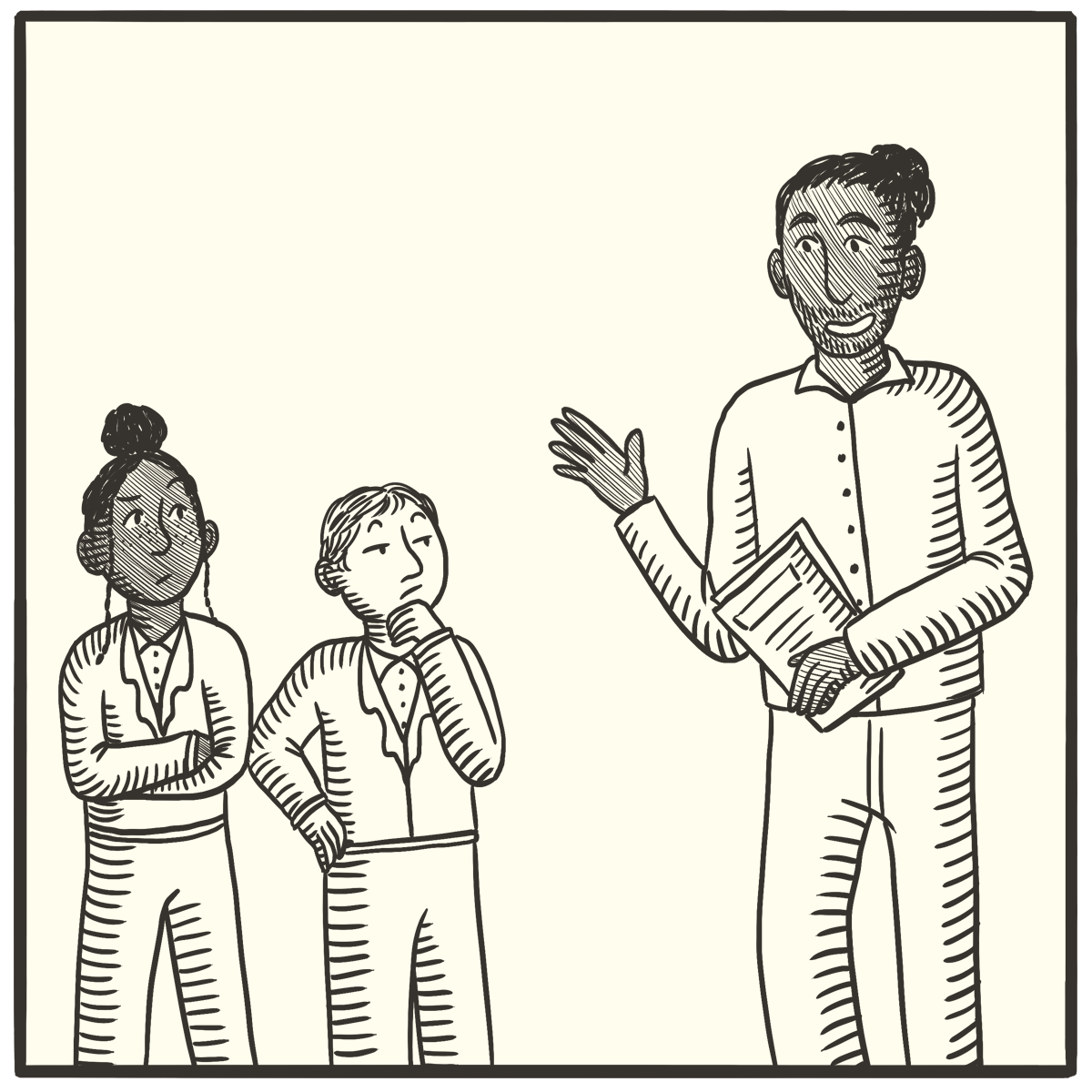
1. A problem
We bill teachers as trustworthy sources of knowledge. But raising people to believe someone 100% of the time seems like a great way to cultivate a susceptibility to conspiracy theories.
2. Basic plan
Once a day, teachers can fold a lie into their lesson, to keep kids on their toes. Kids are encouraged to guess the lie (and teachers tell them if they were right).
3. What you might see
Teachers telling nonsense to set up a thought experiment: “Last summer I was out for a walk, thinking about clouds, when all of a sudden I was pulled up into the air by an alien space ship!” (This I told in a class about buoyancy: if you let go of a helium balloon 100 miles above Earth, would it fall down, float up, or just stay there?)
Teachers saying something reasonable-sounding to hide the revelation at the end of a lesson: “Why don’t we have gills?” (This I asked in a class about lungs: when you understand alveoli, you understand that we do have gills — we just spread them through a sponge.)
Teachers just having fun: “My favorite job ever? That was probably when I worked during the summers in high school as an elite assassin.” (I, um, might have said this earlier this week.)
Students guessing that actually true things (e.g. humans are a type of fish, water comes in “pieces”, the Moon is falling down toward us…) are lies, and then being astounded they’re true.
4. Why?
This is serious intellectual training. Kids are tasked with the (sometimes hard, sometimes easy) epistemological work of figuring out what’s true, but with training wheels.
It’s also fun — it’s a way of ramping up the emotional heft of a lesson — and gives kids another reason to pay attention!
5. Egan’s insight
Where do we see this in the human experience?
“Teaching wisdom through untruth” is chockablock through world cultures. The Islamic world has Nasreddin. Japan has Zen Buddhist koans. Trickster tales the world over tie lying to cleverness. Socrates lies all the frickin’ time.
Does this pattern seem weird? Many cultures would say our belief that teacher should only tell the literal truth sounds weird.
How might this build different kinds of understanding?
This is really a 🧙♂️GAME — you can call it “Can You Spot the Lie?” It does the splits, rooted in SOMATIC understanding’s 🤸♀️PLAYFULNESS, and bridges all the way to IRONIC understanding’s 😏LITERAL IRONY. Along the way, it crosses PHILOSOPHIC understanding’s 👩🔬QUEST FOR TRUTH. (What do these weird emoji mean?)
6. This might be especially useful for…
Naive, overly credulous students. (Also, tricksy teachers.)
7. Critical questions
Q: Lying is WRONG.
I call these “lies”, but they don’t quite meet the vibe of Wikipedia’s definition:
an assertion that is believed to be false, typically used with the purpose of deceiving or misleading someone.
Bluffing in a game a poker isn’t lying — it’s playing the game. This is the same thing.
Q: Well, congrats on your sophistry! Still, lots of parents won’t be cool with this.
This has to be done in a reasonable fashion, and teachers (and principals) need to be quick to help parents reframe this: it’s food for critical thinking. It’s a game. It opens up conversations at home.
But look: if a school doesn’t protect its teachers from every parent objection, it needs to give up on aspirations to real education.
Q: A lot of teachers won’t be cool with this.
This is optional — I wouldn’t recommend a teacher do this if they’re not comfortable.
But I think a lot of teachers would love this, because it’s a way to share their own goofy selves. We want teachers to be authorities — but we don’t want them to be robots. They should be trustworthy, but that shouldn’t mean they’re not playful. This helps.
Q: Can the students opt out?
A few kids would hate this. In an in-person classroom, those kids could be given a special right to be told ahead of time. Or, better: the teacher could have a special “tell” (touching their nose with their left hand), and those kids could be told about it.
Can you think of another way this could go terribly, terribly wrong? Frankly, I bet you could. (When I’ve presented this pattern to people in the past, it’s been… polarizing.) Become a subscriber and join in the comments conversation.

8. Physical space
Nope! Nothing special needed here. (Lying is free!)
9. Who else is doing this?
Like I said above, teaching through deception used to be common. Now, I can’t name a single educational philosophy that recommends it. Have we really fallen so far?1
How might we start small, now?
Tell your kid (or, heck, your spouse, or significant other) that you’ll lie to them once tomorrow! Invite them to do the same to you.
Report back here on how it went.2
10. Related patterns
In some way, this is like Egan’s idea of TELLING JOKES° when young to train kids in careful logical reasoning. Like TEACHING CONSPIRACY THEORIES°, it’s a way to normalize healthy skepticism.
And by giving the lie to all the students at once, it supports EVERY CLASS A BRAIN° — they have something to figure out together.
Afterword:
Learning in Depth summer intensive
Plans are underway! Alessandro and I will be giving a preview of our plans for (and seeking feedback from) folk who’re interested on Saturday, May 11. It’ll be six weeks of daily & weekly challenges in July & August that aim to restructure how you understand everything. (Yes, that does sound overblown. Yes, we are serious.)
If you’re interested in joining, fill out this form.
YES, OBVIOUSLY THAT’S WHAT’S HAPPENED.
The Lost Tools of Learning is not responsible for any relational disasters that result. But seriously, good luck!




I'm struggling with the use of the word "lying" here. For kids who struggle to feel secure and emotionally safe and understood in a classroom community (and I know several such kids quite well) the idea of a teacher intentionally lying repeatedly to students is a bit of a trigger for me.
Similar to Ernest's comment I'm questioning the relational foundation, maturity (of student and teacher) and mutual trust that would be required for this to be effective and constructive, rather than the opposite.
But mostly, I just keep coming back to "what is the goal and objective here?" or put another way, "what is the problem you're trying to solve?" and I wonder is lying the best and only way to accomplish this? If it's the critical thinking/analysis/don't just believe everything you hear skill, I can think of other ways to do this that might be as effective but wouldn't risk damaging the student-teacher relationship. A teacher could play "two truths and a lie" and let the students first, then research/discover the lie. This wouldn't undermine the relational trust but would still exercise and develop these skills.
[Trying to be more positive and less Sea Lion]
What level of relational trust, self-awareness, and psychological safety would you think is necessary for teachers to be able to do this wisely?